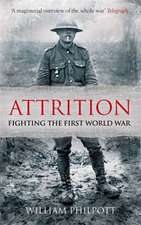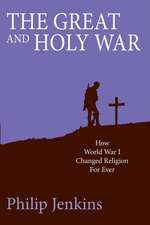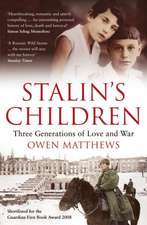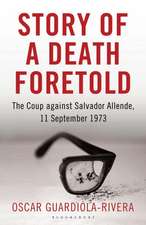Colin Jordan and Britain's Neo-Nazi Movement: Hitler's Echo: A Modern History of Politics and Violence
Autor Dr Paul Jacksonen Limba Engleză Paperback – 27 iun 2018
| Toate formatele și edițiile | Preț | Express |
|---|---|---|
| Paperback (1) | 238.94 lei 6-8 săpt. | |
| Bloomsbury Publishing – 27 iun 2018 | 238.94 lei 6-8 săpt. | |
| Hardback (1) | 774.53 lei 3-5 săpt. | |
| Bloomsbury Publishing – 14 dec 2016 | 774.53 lei 3-5 săpt. |
Preț: 238.94 lei
Preț vechi: 306.37 lei
-22% Nou
Puncte Express: 358
Preț estimativ în valută:
45.72€ • 48.89$ • 38.12£
45.72€ • 48.89$ • 38.12£
Carte tipărită la comandă
Livrare economică 17 aprilie-01 mai
Preluare comenzi: 021 569.72.76
Specificații
ISBN-13: 9781350074682
ISBN-10: 1350074683
Pagini: 304
Ilustrații: 12 bw illus
Dimensiuni: 156 x 234 x 19 mm
Greutate: 0.42 kg
Ediția:NIPPOD
Editura: Bloomsbury Publishing
Colecția Bloomsbury Academic
Seria A Modern History of Politics and Violence
Locul publicării:London, United Kingdom
ISBN-10: 1350074683
Pagini: 304
Ilustrații: 12 bw illus
Dimensiuni: 156 x 234 x 19 mm
Greutate: 0.42 kg
Ediția:NIPPOD
Editura: Bloomsbury Publishing
Colecția Bloomsbury Academic
Seria A Modern History of Politics and Violence
Locul publicării:London, United Kingdom
Caracteristici
Provides wider insights into political extremism historically, with Jordan prominent on a global scale
Notă biografică
Paul Jackson is Senior Lecturer in History at the University of Northampton, UK. He is co-editor of The Anglo-American Far-Right: A Special Relationship of Hate, and has written widely on extreme right politics in Britain, and the history of fascism.
Cuprins
Introduction1. A Working Definition of Neo-Nazism2. From Private Jordan to Emergent Leader3. From Activist to Leader4. The National Socialist Movement5. The British Movement, 1968 - 19756. Semi-Retirement and Gothic Ripples7. The Final Decade and LegacyConclusionsNotesSelected BibliographyIndex
Recenzii
With the current upsurge of the Right, this is a timely study of one of the most prominent leaders of neo-Nazism in postwar Britain . This sophisticated study not only illuminates how the far Right operated, but also provides an excellent discussion of its ideas. Summing Up: Highly recommended. Most levels/libraries.
[An] important, thoroughly researched, and lucid book that presents convincing arguments with far-reaching implications . Jackson displays an excellent grasp of his topic, his style is highly accessible . [A] book that makes a valuable contribution to the historiography of fascism (and other extreme ideologies) and the social and political history of postwar Britain.
Paul Jackson has made an important contribution by producing an impeccably researched monograph which stands out in an increasingly crowded field ... Ground-breaking ... [It] deserves to be read not just by historians of the far right, but also by policy-makers tasked with preventing extreme right terrorism.
By far the greatest strength of Dr Jackson's study of Colin Jordan is its fresh and utterly up-to-date scholarship which draws upon a truly impressive range of research materials, from newspapers and related print-media to unpublished archival resources. Merely as a feat of scholarship, the book represents a mature, highly professional achievement. But just as impressive is the strength of Dr Jackson's accessible writing.
Paul Jackson's political biography of Colin Jordan - a man described as the 'godfather' of British neo-Nazism - is superlative. Possessing a sophisticated conceptual understanding of neo-Nazism, Jackson recounts the political odyssey of this unapologetic British fascist in rich and painstaking detail. Colin Jordan has now entered the neo-Nazi pantheon. Jackson's first-rate study tell us why this man is so revered by those that think that "Hitler was Right!"
Paul Jackson has written a fine book which greatly adds to our understanding of the complex phenomenon of neo-Nazism and the wider ideology and culture of Britain's far right in the post-1945 period. Jackson's study benefits from having been thoroughly grounded in the available primary documents relating to Colin Jordan's life and political activities, as well as the best and most recent theoretical work in fascist studies. In summary, this book represents a very important contribution to the scholarship on the politics of the extreme right.
Paul Jackson has produced what must be regarded as the definitive political biography of Colin Jordan, Britain's leading neo-Nazi. He has traced the political and, above all, the ideological development of Jordan from his student days at Cambridge in the late 1940s/ early 1950s until his death in 2009, by which time he had become an unashamed exponent of Hitler and National Socialism. Jackson has also meticulously documented how Jordan honed his talents as a (sometimes self) publicist and propagandist, as well as his more limited leadership qualities. In so doing, he has thrown much light on the overall development of the post-war British far right from Mosley's Union Movement to Nick Griffin's leadership of the BNP in the new millenium, chronicling the many schisms and splits which the various parties and groupuscules suffered in those years and in which Jordan was usually involved.
[An] important, thoroughly researched, and lucid book that presents convincing arguments with far-reaching implications . Jackson displays an excellent grasp of his topic, his style is highly accessible . [A] book that makes a valuable contribution to the historiography of fascism (and other extreme ideologies) and the social and political history of postwar Britain.
Paul Jackson has made an important contribution by producing an impeccably researched monograph which stands out in an increasingly crowded field ... Ground-breaking ... [It] deserves to be read not just by historians of the far right, but also by policy-makers tasked with preventing extreme right terrorism.
By far the greatest strength of Dr Jackson's study of Colin Jordan is its fresh and utterly up-to-date scholarship which draws upon a truly impressive range of research materials, from newspapers and related print-media to unpublished archival resources. Merely as a feat of scholarship, the book represents a mature, highly professional achievement. But just as impressive is the strength of Dr Jackson's accessible writing.
Paul Jackson's political biography of Colin Jordan - a man described as the 'godfather' of British neo-Nazism - is superlative. Possessing a sophisticated conceptual understanding of neo-Nazism, Jackson recounts the political odyssey of this unapologetic British fascist in rich and painstaking detail. Colin Jordan has now entered the neo-Nazi pantheon. Jackson's first-rate study tell us why this man is so revered by those that think that "Hitler was Right!"
Paul Jackson has written a fine book which greatly adds to our understanding of the complex phenomenon of neo-Nazism and the wider ideology and culture of Britain's far right in the post-1945 period. Jackson's study benefits from having been thoroughly grounded in the available primary documents relating to Colin Jordan's life and political activities, as well as the best and most recent theoretical work in fascist studies. In summary, this book represents a very important contribution to the scholarship on the politics of the extreme right.
Paul Jackson has produced what must be regarded as the definitive political biography of Colin Jordan, Britain's leading neo-Nazi. He has traced the political and, above all, the ideological development of Jordan from his student days at Cambridge in the late 1940s/ early 1950s until his death in 2009, by which time he had become an unashamed exponent of Hitler and National Socialism. Jackson has also meticulously documented how Jordan honed his talents as a (sometimes self) publicist and propagandist, as well as his more limited leadership qualities. In so doing, he has thrown much light on the overall development of the post-war British far right from Mosley's Union Movement to Nick Griffin's leadership of the BNP in the new millenium, chronicling the many schisms and splits which the various parties and groupuscules suffered in those years and in which Jordan was usually involved.

























